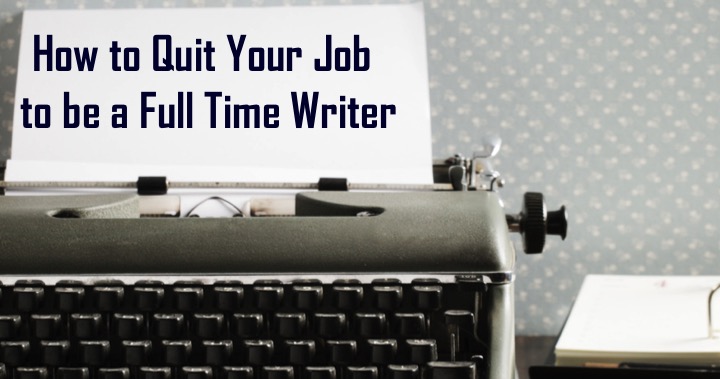
One day you will wake up and discover that your writing career has expanded to the point where you are earning more money from it than from your regular full-time job. While you may wish to continue working at both jobs for a period of time, either to build up a nest egg or to make sure you are going to maintain the momentum of your freelance writing, eventually you will probably want to quit your regular job and move entirely to living off of and working full time at your freelance writing career.
There are a few things you need to keep in mind when you do this. For starters, you want to make absolutely certain that you are able to support yourself from your freelance writing work. Another important consideration involves things that you might not have thought of before but need to think about now.
There are several obvious money-saving benefits to quitting your regular job. Depending on the appropriate form of dress where you work, you could save hundreds or even thousands of dollars per year in clothing alone. Then there are commuting costs and the costs for lunch every day. These things add up, often to a large chunk of money each year.
Before quitting your job, make sure that you have handled issues with your retirement plan, any 401k you might have and health insurance. These are all matters that become your sole responsibility once you have decided to work for yourself. Most people will work for at least a few months in preparation for quitting and this allows them the time to figure these details out well in advance. A financial planner would be a good person to see about these issues.
One of the biggest issues that you might face is regarding health insurance. While you may have a policy through your employer as part of a benefits package, this will end when you leave the job. A smart move is to see both your family doctor and dentist for a checkup prior to quitting. A good financial planner will be able to help you decide on a good independent insurance policy or you can find one on your own.
Those things cover the most obvious financial issues that you have to deal with before quitting your job. There are a few more issues that need to be handled as well. While not obviously financial, they could have a financial impact in the future.
Leave on good terms with your boss and coworkers
Not everyone you have ever worked with is a saint or even a friend. There were likely several people you would love to tell off. Resist this impulse. While you are leaving the company, you are not leaving the workforce. We live in a very mobile society and the coworker that you tell off today could be the marketing director in charge of hiring a freelance writer next year.
Another important consideration in leaving on good terms is that most people tend to stick with what they know. Just because you are no longer a sale rep with your insurance company it doesn’t mean that you aren’t going to want the company to use your freelance writing services later on in the future. Besides, people talk and gossip. You don’t want to be known as the once difficult employee who told people off when you quit. Word gets around and it could impact whether or not a client wants to hire you.
You also want to remember that these connections could lead to other networking opportunities in the future. You could end up with a great client because he happened to mention in a meeting at your old company that he was looking for someone to write a new brochure and you name pops up.
Give plenty of notice
Don’t decide on Sunday that you are quitting and then fail to show up for work on Monday. That is unethical and shows that you lack maturity as well as basic respect for others. When you make the decision to quit your job, think about it until you are actually ready to literally walk out the door. Then put in the required notice for your company, thank them for being good employers and offer to help them train your replacement. Leaving with good grace allows the company to feel good about you and your contribution to them. Leaving on bad terms is really just not worth it in the long run.
Consider how you would feel if an employee just quit without notice. No matter the reason you would be left in the lurch, have to struggle to find someone to cover for them and be at least a little irritated. At the end of the day you have been stressed out by their actions and would not look on them favorably. Put yourself in the position of your employer and leave in an appropriate manner.
Remember that networking never ends
No matter how much (or how little) networking you have done in the past, it’s now a requirement for your future. Because you probably know your particular industry very well, this is going to be your most comfortable place to network for freelance writing clients, at least in the beginning. You are most likely going to run into colleagues from your past company many times over the years. Leaving your job on a positive note will help make these future meetings less awkward as well as potentially fruitful. You never know when a former colleague will point you out and mention that you left to be a freelance writer….to a person desperately looking for a good freelance writer!
Ask for references and recommendations
But wait…why would you need these if you are going to be working for yourself??? The reason is simple: you never know when you might need them. You would not be the first freelance writer to mention that you have experience at XYZ insurance and have the client call to verify this information. Being prepared in advance with the names of references can spare you having to scramble for them in the future.
Before you close the door, open the window
What that means simply is to let your soon to be former employer know what line of work you are entering and offer them your new services. While they may not need you today, they might next month. You have a solid track record with them; they know you and you left on good terms. You are the perfect person for them to call if they need a freelance writer.
Prepare yourself mentally
Once you are working for yourself on a full time basis you will need to remember that you are actually still a member of the workforce. While your schedule will be of your own making, you will still have one. It’s important to remember that keeping up positive working habits is just as important when you work for yourself as when you work for someone else. Clients still need to know when and how to reach you and deadlines still have to be met.
Keeping regular working hours, whatever those hours may be, is vitally important to your mental wellbeing especially in the early months of working for yourself. Some people even find it helps to get dressed for work, though in a bit of a more relaxed manner. Personally, I have a numerous writing t-shirts that I wear as my working uniform. Use whatever works best for you to get you into the working mindset.
Oddly enough your biggest mental hurdle will probably be other people. Many times friends and family think that you are always available. Because they have a more formal schedule that is imposed by an exterior force (their boss) you suddenly seem to be someone who has unlimited time to do what you want. If you allow them to impose on you when you should be working it can cause problems with your career. Insisting that people respect your new working hours is a vital part of your mental preparation.
Quitting your regular job to go into freelance writing full time is an exciting and rewarding step. While it requires some financial planning, most of what is required is mental preparation. You are now going to be responsible for all of those things that you once relied on an employer to handle. Once you navigate those aspects of your working life being on your own will be far less intimidating and a lot more fun. Few jobs are as rewarding as being a freelance writer but getting the transition period right will make it much easier on your life.
